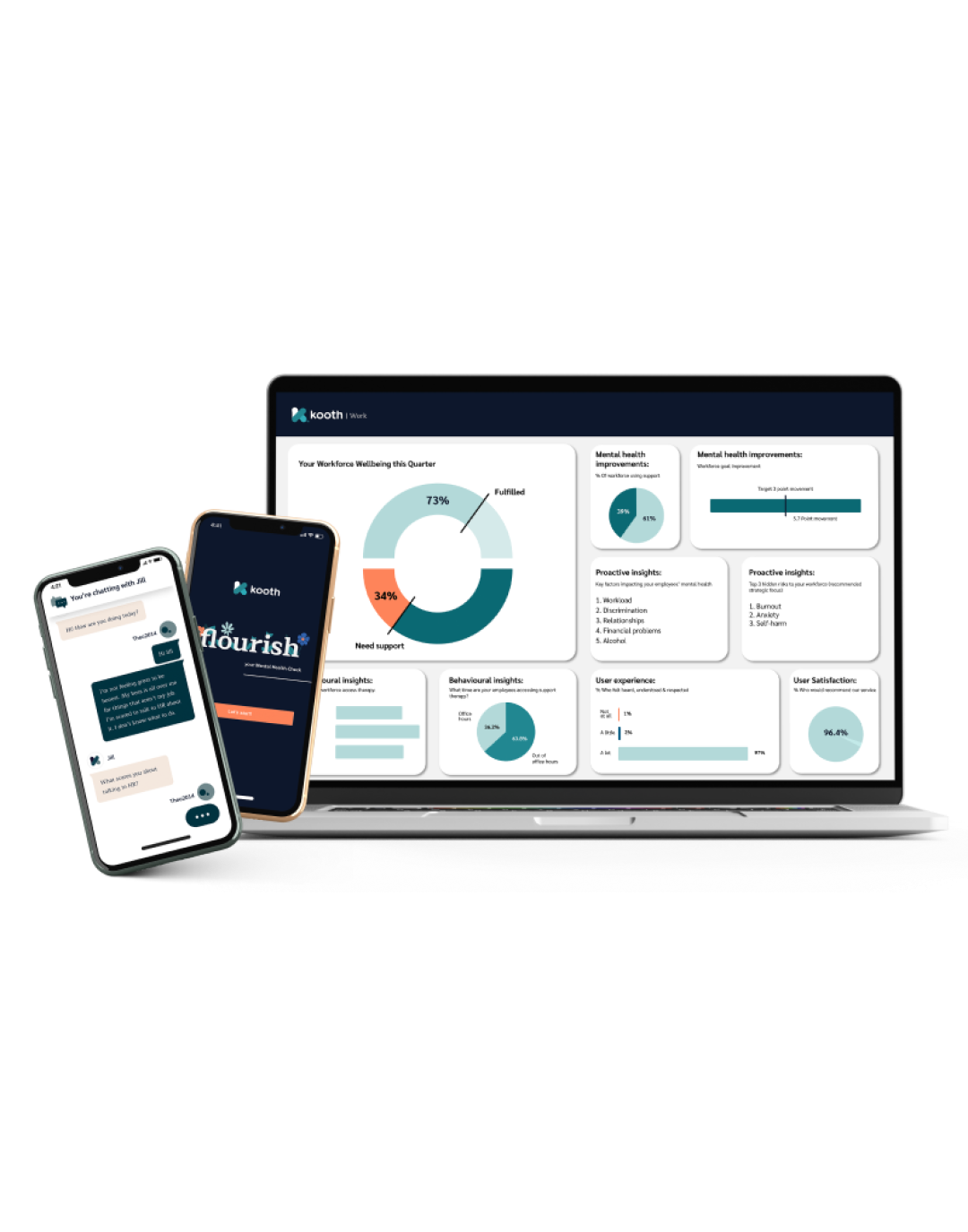Harriet Cresswell, talent acquisition partner here at Kooth, shares helpful insights into how employers can support their employees' mental wellbeing and afford equal opportunities for their remote workforces.
How does remote working impact employee mental health and career progression?
As you might expect, there isn’t any one answer to this question. Whether or not remote working is a primarily positive or negative experience is largely dictated by circumstances.
If someone lives in their own home and has a dedicated home office space, remote working can afford them greater flexibility and a better work-life balance. In addition, improved work-life balance can contribute to better mental health, which in turn helps with career progression, as people become more confident.
However, if someone lives in a shared house and works from their living room or bedroom, this can negatively impact mental wellbeing.
Working in your living space can make it harder to switch off from work at the end of the day, heightening stress and affecting sleep. This is not to mention the physical effects of working hunched over a laptop, as opposed to working from an office chair. Over the long term, this hurts mental health and career progression.
Not being in regular contact with co-workers can also lead to some people feeling lonely and isolated, particularly those who live alone. But, more than this, it removes the opportunity for informal feedback and learning opportunities. For newer employees, in particular, these opportunities are vital for building skills and confidence; without them, people can start to lose faith in their abilities.
How can employers support remote workers?
It’s the employer's responsibility to ensure that all their remote and in-person employees have access to the training and support they need to do their jobs well and progress in their careers.
There is stigma around mental health, feelings of loneliness and isolation, and even asking for training. Employers must actively build an open and honest relationship with their employees, so that people feel safe to come forward and ask for the support they need.
Some measures you can put in place to ensure wellbeing and quality of opportunity for remote workers are:
- Use Key Performance Indicators (KPIs) to help staff track their progress. KPIs are the most transparent way for employees and line managers to gauge performance, which helps reassure, build confidence, and highlight training needs.
- Spend time creating comprehensive training documentation, so remote workers have easy access to the information they need.
- Review your internal promotion processes to ensure they apply the same frameworks as external recruitment. For example, a panel should always make promotion decisions, and all candidates' assessment criteria should be the same. Using frameworks removes the possibility of inadvertently favouring in-person employees.
- Clearly (and regularly) communicate expectations. If employees know what you expect, it builds confidence in their abilities.
- Allow as much flexibility as possible for the role in terms of location and working hours. Employees thrive when they can design their working lives.
- Be proactive about arranging a diverse range of activities for staff, and encourage staff to do the same for themselves. For example, at Kooth, we’ve had great success with a Slack channel, where people can share cat memes or gardening photos - it doesn’t always need to be a huge event.
- Encourage employees to switch off their work communications outside of working hours, particularly allowing enough time to wind down before bed. Line managers must set and model this expectation, or bad habits will start to creep in.
- Encourage regular screen breaks and time outside, and don’t schedule back-to-back meetings.
- Assess employees' home working setups, and ensure they have everything they need to work comfortably.
- Send regular surveys to staff to let them comment on their wellbeing and how comfortable they feel talking with their line managers. Then, take action on the things they raise.
- Implement wellness days that employees can take at short notice if they notice their mental health is slipping.
Employee wellbeing initiatives are also enormously beneficial, giving employees the chance to look after their mental health with the help of professionals. Kooth Work, a digital mental wellbeing platform, offers employees 24/7 access to 1:1 support from a counsellor or mental health professional, as well as online forums and self-help resources. Employers also get regular data insights that outline the underlying risks in their employees, which can help to plan proactive wellbeing measures.
When it comes to mental health, prevention is better than cure. Building a workplace where remote workers can thrive will take time and effort, but the payoff is greater staff retention and a broader choice of staff, as you can recruit people in any location. In the long term, you will have a thriving and productive workforce perfectly positioned to help you achieve your goals.





